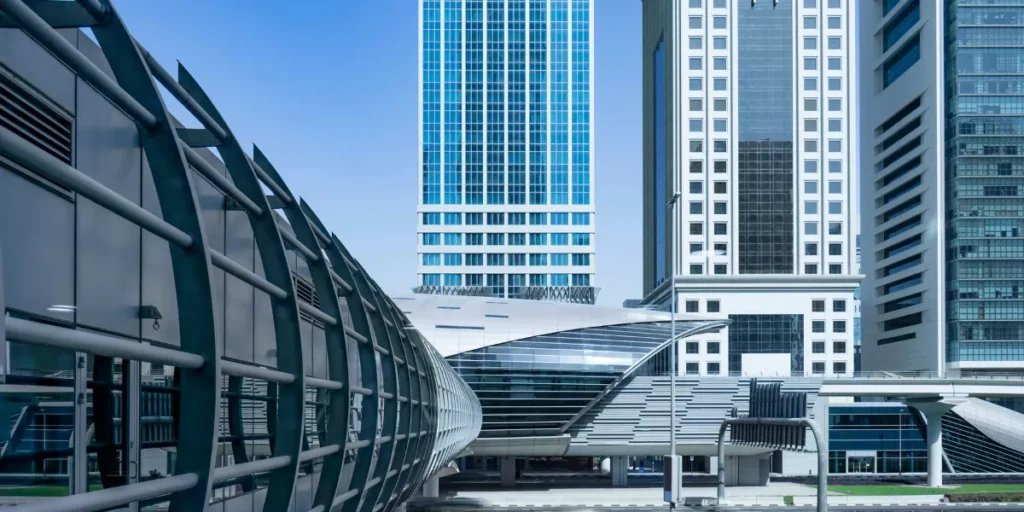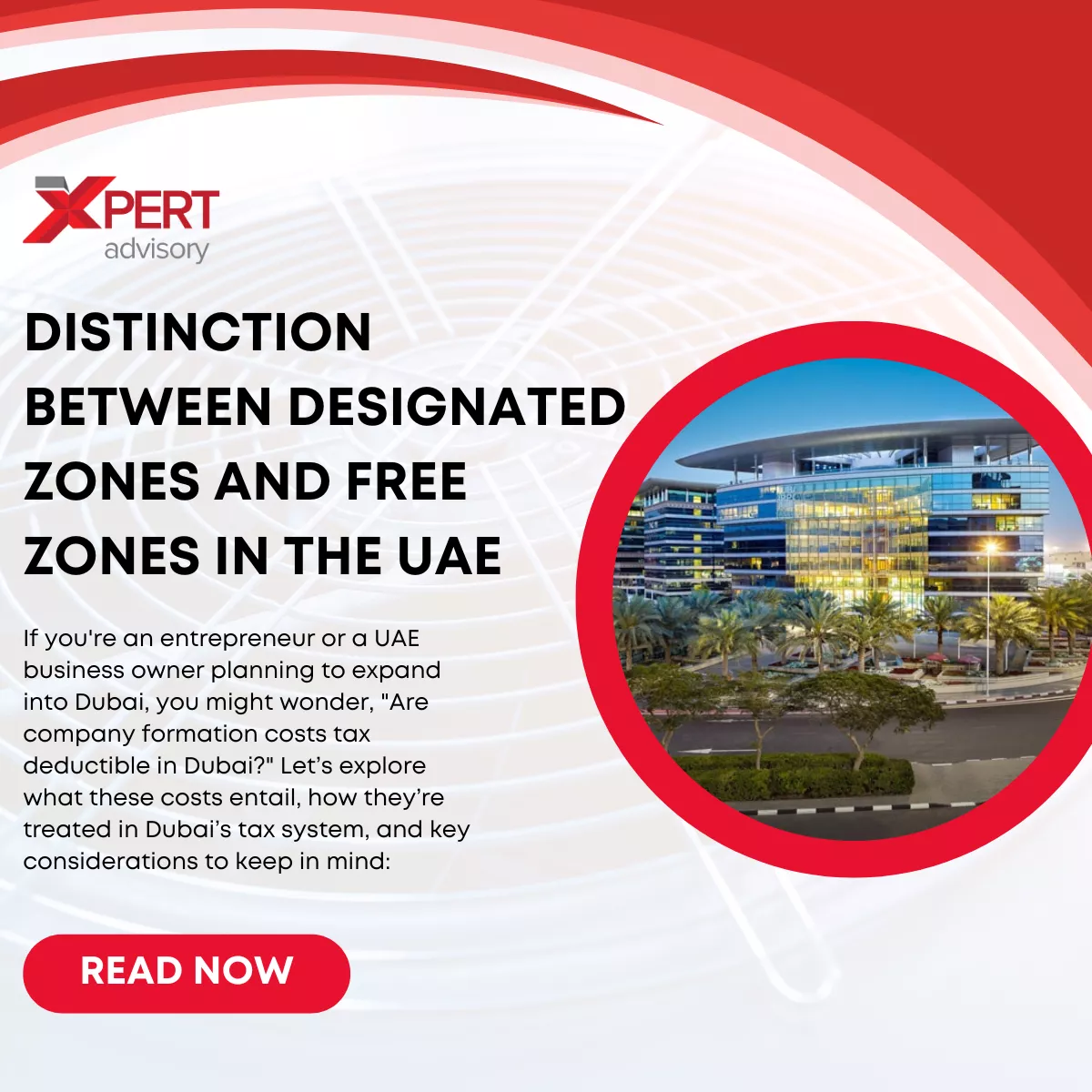When setting up a business in countries offering specialized economic zones, such as the UAE, it’s essential to understand the options available: designated zones and free zones. Designated and free zones are intended to attract businesses by offering tax breaks, customs advantages, and relaxed policies.
We will now explain in detail the difference between designated zone and free zone, helping corporations make an informed choice about where to establish their company for maximum advantages:
What is a Designated Zone in the UAE?

Designated zones in the UAE are strategically chosen areas. They are typically located near major ports, airports, or transport hubs. Businesses operating in these zones benefit from tax advantages and streamlined customs procedures. Moreover, in the UAE, designated zones are unique economic regions that qualify for VAT (Value Added Tax) exemptions on certain goods and almost all services.
These designated zones in the UAE are commonly advanced zones to promote manufacturing, trading, and logistics businesses and are often equipped with infrastructure that supports these industries.
For companies dealing in the physical movement of goods imported within a designated zone, which includes import and export businesses, designated zones provide a significant advantage subject to VAT law exemptions on items moving outside the UAE territory.
Furthermore, businesses within the designated zones must import raw materials or export finished products without incurring VAT, making those zones attractive for companies within the supply chain industry.
However, it’s well worth noting that not each UAE free zone qualifies as a designated zone. In countries like the UAE, special zones are especially indexed with the aid of the Federal Tax Authority (FTA), and only those on this listing can provide the associated tax benefits.
What is a Free Zone?
A free zone in the UAE, also referred to as a free trade zone or free economic zone, is a designated area within UAE that allows businesses to operate with unique incentives and a more relaxed regulatory framework.
Free zones are created to encourage foreign investment and offer an attractive business environment by providing benefits like 100% foreign ownership, tax incentives, and simplified business setup tactics. Unlike different designated zones, free zones won’t offer VAT exemptions on goods, but they’ve numerous different monetary and structural advantages.
One of the main appeals of free zones is that they allow a foreign investor to fully own their companies without requiring a local sponsor. Additionally, designated zones are free zones that offer tax breaks, which include exemptions from corporate and personal income taxes. This makes them popular among companies that want to operate without heavy tax burdens.
Free zones are also industry-precise, often designed to cater to corporations in fields like technology, media, logistics, or healthcare, with specialized supplies of goods and services to support these industries.
Major Difference Between Designated Zone and Free Zone
Below are the major difference between designated zone and free zone:
Approach to VAT Rules & Custom Regulations
One of the fundamental distinctions between designated and free zones lies in their approach to normal VAT rules and customs rules. While designated zones offer VAT exemptions on goods under specific conditions, free zones normally do not offer this benefit. However, they compensate with different benefits like full ownership and flexible business structures.
Business Ownership
In terms of business ownership, free zones are exceedingly favorable to foreign buyers who want entire control over their companies, as they allow 100% foreign ownership. This is a significant advantage for international companies that prefer not to involve local sponsors in their operations. In contrast, designated zones may still require a degree of local involvement or sponsorship depending on the country’s specific executive regulations.
Market Access
Another major distinction is market access. Companies in free zones are treated as being outside in the UAE regularly confined in terms of selling their services or products directly to the local market (the mainland). If a free zone company wishes to conduct business within the local market, it may need to work with a local distributor or appoint an agent. Designated zones, however, are often more closely integrated with the local market, allowing for easier access to business activities to mainland clients.
Advantages of Designated Zones
Designated zones are specifically high-quality for companies engaged in import-export and logistics activities. Here’s a more in-depth look at the benefits they provide:
VAT Exemption on Goods Transactions

Designated zones allow companies to move goods without incurring VAT in the UAE at the standard rate on imports and exports, which is invaluable for businesses dealing with large volumes of products. For instance, a manufacturing company can import raw materials, supply goods within the zone, and export them without paying VAT purposes, reducing their overall tax burden.
Simplified Trade Processes
Designated zones are strategically located near ports and airports to enable easier import-export activities. The simplified customs regulations and license allow companies to move goods quickly and successfully, which is essential for companies reliant on time-sensitive logistics.
Global Reach
Designated zones offer access to worldwide markets, making them perfect for companies seeking to operate territory outside the uae. Many businesses set up in this zone shall be treated as a designated zone to take advantage of the streamlined export strategies, making it easier to deliver goods to overseas markets.
Advantages of Free Zones
Free zones cater to a broader range of industries, from technology to healthcare, and offer several particular benefits:
100% Foreign Ownership
Free zones are highly popular among foreign investors because they permit businesses to be fully owned by way of non-nationals. This structure is mainly useful for companies looking for complete control over their operations. This is a significant draw for international corporations to maintain security measures and customs.
Reduced Corporate Taxes and Fees
Free zones provide exemptions from corporate taxes, income taxes, and customs duties on imports and exports. These economic benefits can be especially beneficial to companies, assisting them keep more income and operating cost-effectively.
Industry-Specific Infrastructure
Many free zones are established to support unique industries, with dedicated facilities and services that cater to companies in sectors like media, generation, and healthcare. For example, Dubai Media City provides specialized centers for media and innovative agencies, while Dubai Healthcare City presents a supportive environment for healthcare companies.
Which Zone is Right for Your Business?
Choosing between a designated zone and a free zone depends on the kind of enterprise, target market, and long-term goals. For instance, in case your business is based on alternative logistics and you’re seeking out tax breaks on item transactions, a designated area can be best.
On the other hand, if you are within the service industry or need industry-specific infrastructure with full ownership and tax incentives where applicable, a free zone might be more appropriate, which is considered to be outside the state.
If the number one aim is to access international markets with minimum local interference, a free zone in the United Arab Emirates may be advantageous. However, businesses targeting local purchasers may find designated zones in UAE that offer better integration with the nearby economy and a higher health.
Concluding Thoughts
Both designated zones and free zones offer wonderful advantages, and the right preference largely relies upon the business’s specific needs. Designated zones are best for companies that want to gain from VAT exemptions and have less difficulty getting admission to local markets, even as free zones offer full foreign ownership, tax benefits, and specialized infrastructure for processing of goods within a designated zone.
Understanding these zones and carefully weighing the benefits and limitations can make a large difference in a business’s growth trajectory. Getting to know about the difference between the designated zone and free zone can make you make an informed decision.
If you’re ready to make the right choice for your business? Contact Xpert Advisory today to discover the ideal zone setup that aligns with your growth goals and operational needs.
Frequently Asked Questions
Can a business in a free zone sell directly to the local market?
Free zone companies are generally restricted from direct sales to the local market (mainland) and may need to work with a local distributor or appoint an agent to operate internal procedures regarding the method within the local economy.
Are all free zones considered designated zones?
No, not all free zones qualify as designated zones. Designated zones are specifically recognized for VAT benefits by authorities like the Federal Tax Authority (FTA) in the UAE, while free zones do not automatically receive these scope of VAT exemptions.
What types of businesses benefit most from designated zones?
Businesses engaged in trading, manufacturing, and logistics, especially those that rely on importing and exporting goods, benefit greatly from designated zones due to VAT exemptions and proximity to major transport hubs.
Is 100% foreign ownership allowed in designated zones?
In designated zones, foreign ownership rules may vary depending on the country’s specific regulations treated as a territory outside the UAE. Unlike certain free zones, which generally allow full foreign ownership, designated zones may still require local sponsorship or partnerships.
How do tax benefits differ between designated and free zones?
Designated zones offer VAT exemptions on certain goods transactions but may not offer other tax incentives. Free zones, on the other hand, provide corporate tax exemptions, personal income tax exemptions, and import-export duty exemptions.
How can I decide if a designated zone or free zone is right for my business?
Consider factors such as business type, target market, operational needs, and tax preferences. For example, if your business is logistics-focused, regarding the method of keeping a designated zone perfect for you.


